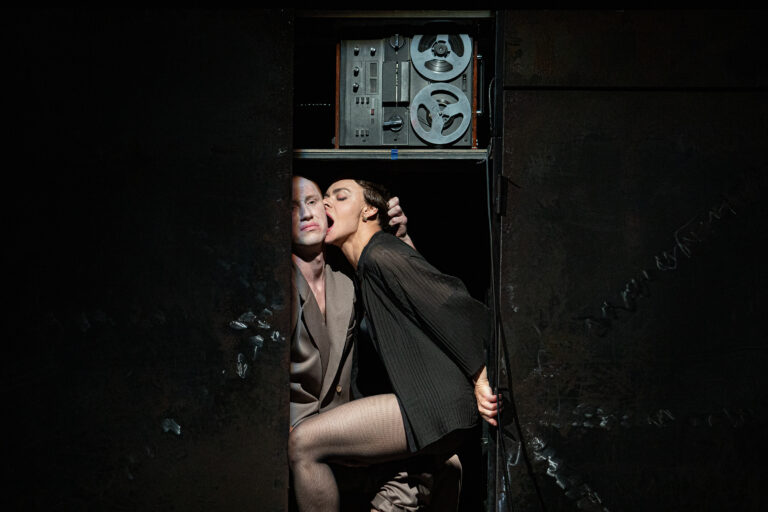Writer: Albert Camus
Director: Ivan Uryvskyl
Brought to stage as part of the Dublin Theatre Festival 2025 by The Ivan Franko National Academic Drama Theater from Ukraine, Albert Camus’s 1944 play about the Roman Emperor Caligula was written from a place and time when the world was fighting a devastating war brought about by fascist ideology, dictatorship and a craving for power without bounds. All too familiar tropes exist in Europe in 2025 and equally are resonant of Caligula’s Rome where reputedly the emperor ruled by fear, threat and violence. Petro Bogomazov’s superb set stages Rome as a Soviet Bloc era nightmare: the characters are generally confined within an industrial-style copper-hued metal box with various doors and drawers where characters appear and are slammed back inside, lighting beautifully enhancing the dark mood and discordant sounds and music allowing for the air of menace to prevail. In one section the window draws back to reveal the ever-listening ears of Helicon (Olena Hohlatkina) with her tapes secretly recording conversations while Caligula’s lover Caesonia (Tetiana Mikhina) moves within the spaces, sometimes only evident by her glamourous high heels dangling from a frame.
Before we meet Vitaliy Azhnov’s Caligula, two of his closest friends and potential murderers appear on stage and discuss treasonous plans against him. Praetorian Guard Cherea (Renat Settarov) despises Caligula’s disregard for humanity and wants Caligula dead; poet Scipio (Akmal Huriezov) argues against killing Caligula even though the emperor has murdered his father. Caligula, played with wonderful presence by Azhnov, reveals himself as a grotesquely debauched and jaded youth of twenty-nine, his petulant and impossible desires for absolute power depicted in his demand that Helicon acquire the moon and make the sun set in the east for him. Helicon demonstrates absolute loyalty to Caligula – as so many have before in similar situations – and he is demonstrably loved by Caesonia but he does not want what is already his; he wants control over what is not possible or available. As the play unfolds Caligula’s future is clearly in doubt but he does not seem to care even for his own life; he makes up his face, dances in a blue silk dress (kudos to costume designer Tetiana Ovsiichuk), and plays seducer to his lover and friends. His complicated persona also seduces the audience; he is compelling in his awfulness. As murders play out and blood is shed the performance enthrals to the bloody end.
Camus’s play is verbose and it is startling how relevant and resonant the text seems, particularly with respect to Russia’s war on its sovereign neighbour Ukraine. At times the speed of delivery (emoted with great passion) makes following the English surtitles slightly difficult; the images presented on stage are compelling and it is hard to take one’s eyes away. This is a small gripe, artistically and meaningfully the play delivers so much and its impact was evidently very moving for the strong Ukrainian presence in the audience. Very touchingly, after a standing ovation reflecting a heartfelt and visually stunning performance, red roses were presented to the cast and a Ukrainian flag produced to confirm the analogous nature of the story to which we were all witness.
Runs Until 11th Oct 2025.

